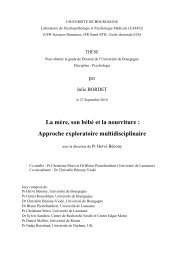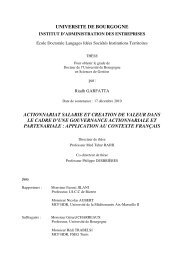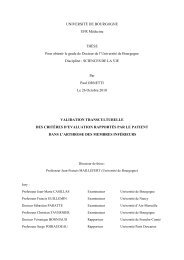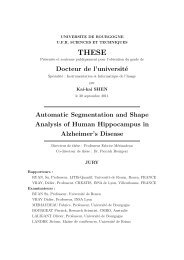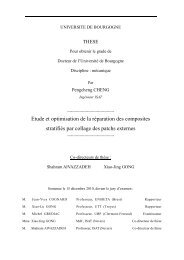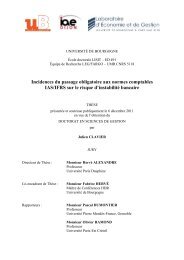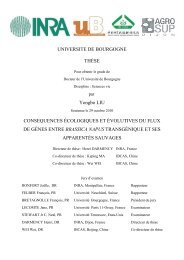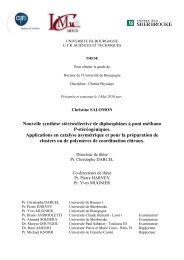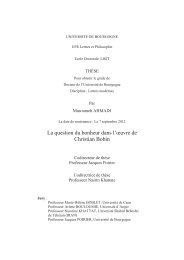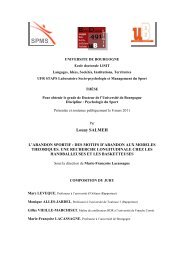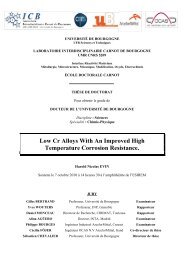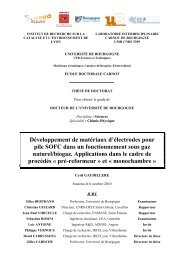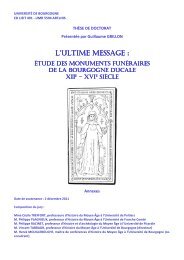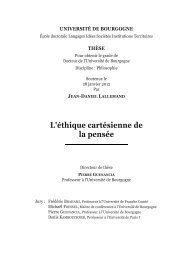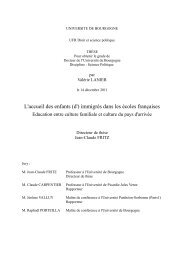Higher education in Asian countries and the role of international ...
Higher education in Asian countries and the role of international ...
Higher education in Asian countries and the role of international ...
Create successful ePaper yourself
Turn your PDF publications into a flip-book with our unique Google optimized e-Paper software.
7.4 A shift <strong>in</strong> IGOs’ stance<br />
257<br />
A shift <strong>in</strong> <strong>the</strong> IGOs‟ approach towards higher <strong>education</strong> is more prom<strong>in</strong>ent s<strong>in</strong>ce <strong>the</strong> last decade:<br />
higher <strong>education</strong> <strong>role</strong> <strong>in</strong> economic development is be<strong>in</strong>g accepted globally <strong>and</strong> an enhanced<br />
engagement <strong>of</strong> world organizations <strong>and</strong> governments is evident <strong>in</strong> low <strong>in</strong>come <strong>and</strong> high <strong>in</strong>come<br />
<strong>countries</strong> but <strong>the</strong> level <strong>and</strong> <strong>in</strong>tensity is different (Bloom, Cann<strong>in</strong>g, & Chan, 2006).<br />
The World Bank Group supports, promotes <strong>and</strong> propagates <strong>the</strong> neo-liberal globalization <strong>in</strong><br />
economics <strong>and</strong> <strong>education</strong> as well this is result<strong>in</strong>g <strong>in</strong> an enhanced <strong>role</strong> <strong>of</strong> market <strong>and</strong><br />
organizations <strong>in</strong> <strong>education</strong> particularly higher <strong>education</strong> (Jakobi, 2007). The World Bank<br />
commissioned <strong>and</strong> published a series <strong>of</strong> research studies to explore <strong>the</strong> l<strong>in</strong>k between higher<br />
<strong>education</strong> <strong>and</strong> development. The World Bank report Knowledge <strong>and</strong> Development that was<br />
published <strong>in</strong> 1999, presented studied <strong>the</strong> relation <strong>of</strong> knowledge <strong>and</strong> <strong>in</strong>come <strong>in</strong> <strong>the</strong> develop<strong>in</strong>g<br />
<strong>countries</strong>. This report found that knowledge, not capital, is <strong>the</strong> key to human well be<strong>in</strong>g <strong>and</strong><br />
economic growth. It stressed upon need <strong>of</strong> extension <strong>and</strong> expansion <strong>of</strong> teacher tra<strong>in</strong><strong>in</strong>g through<br />
distant <strong>and</strong> open universities by us<strong>in</strong>g ICTs <strong>in</strong> <strong>the</strong> develop<strong>in</strong>g <strong>countries</strong> (The World Bank, 1999).<br />
To explore <strong>the</strong> future <strong>of</strong> higher <strong>education</strong> <strong>in</strong> <strong>the</strong> develop<strong>in</strong>g <strong>countries</strong>, <strong>the</strong> World Bank <strong>and</strong><br />
UNESCO, convened a Task Force on <strong>Higher</strong> Education <strong>and</strong> society that gave its report <strong>in</strong> March<br />
2000, titled <strong>Higher</strong> Education <strong>and</strong> Develop<strong>in</strong>g Countries: Peril <strong>and</strong> Promise. This report found<br />
that higher <strong>education</strong> is essential as it contributes to socio-economic development <strong>of</strong> <strong>the</strong><br />
develop<strong>in</strong>g <strong>countries</strong> <strong>in</strong> this era <strong>of</strong> knowledge based economy. In most develop<strong>in</strong>g <strong>countries</strong><br />
higher <strong>education</strong> exhibits severe deficiencies: <strong>the</strong> problem <strong>of</strong> <strong>in</strong>sufficient scientific capacity is<br />
acute; traditional ways <strong>of</strong> runn<strong>in</strong>g higher <strong>education</strong> systems; <strong>and</strong> <strong>in</strong>adequate resources, both<br />
physical <strong>and</strong> human.<br />
Accord<strong>in</strong>g to this report, despite <strong>of</strong> unprecedented progress <strong>in</strong> higher <strong>education</strong> <strong>the</strong> develop<strong>in</strong>g<br />
<strong>countries</strong> are fall<strong>in</strong>g fur<strong>the</strong>r beh<strong>in</strong>d <strong>in</strong>dustrial <strong>countries</strong> <strong>in</strong> terms <strong>of</strong> <strong>the</strong>ir science <strong>and</strong> technology<br />
capacities <strong>and</strong> achievements because <strong>of</strong> <strong>in</strong>adequate attention. There is a need <strong>of</strong> policy reforms to<br />
protect <strong>and</strong> promote <strong>the</strong> public <strong>in</strong>terest <strong>in</strong> higher <strong>education</strong> <strong>and</strong> as well as a strong <strong>in</strong>ternational<br />
susta<strong>in</strong>ed <strong>in</strong>tellectual <strong>and</strong> f<strong>in</strong>ancial support for streng<strong>the</strong>n<strong>in</strong>g <strong>the</strong> scientific capacity. The Task<br />
Force stressed upon effective efforts from higher <strong>education</strong> <strong>in</strong>stitutions, policy makers <strong>and</strong><br />
<strong>in</strong>ternational donors (The World Bank, 2000). Policymakers <strong>in</strong> <strong>education</strong> are responsible for<br />
develop<strong>in</strong>g a vision <strong>and</strong> strategy for <strong>education</strong>al development, <strong>and</strong> mobiliz<strong>in</strong>g support <strong>and</strong>



